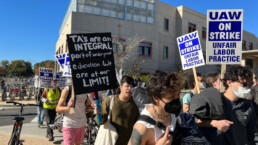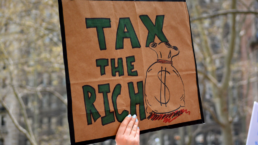If McDonald’s is a real estate company that sells hamburgers, the U.C. system is a real estate company that sells degrees. Grad students are striking not least so they can afford to live where they work.
by Tracy Rosenthal, The New Republic
The University of California—a system of higher education encompassing 10 campuses, 280,000 students, 230,000 faculty and staff, and an operating budget greater than that of 25 states—has offered several reasons why graduate student workers deserve to be underpaid. The jobs are apprenticeships; hardship will be retroactively remedied by future employment. The jobs are part-time, meant to complement workers’ role as students. But as prospects in higher education constrict, graduates face more contingent and contract work. Part-time pay means workers must fill the gap with generational wealth or by decades of servicing debt. On a school schedule, academic workers get nine paychecks a year. The rent, of course, is due in all 12.

According to internal research done by their union, UAW 2865, half of grad workers in the U.C. system pay half their incomes in rent. Ninety-two percent are “rent-burdened,” meaning their landlords claim more than 30 percent of their pay. While U.C. President Michael Drake enjoys a $6.5 million six-bedroom in Berkeley paid for by the state, grad workers sleep on couches, in cars, or in shelters. They pile into overcrowded housing or commute from hours away. On November 15, 19,000 graduate students joined three other UAW organizing efforts, representing postdocs, student researchers, and academic researchers, to inaugurate a strike of 48,000 people—the largest strike of academic workers in U.S. history. “Either you’re striking for yourself because that’s the position you’ve been put in, or you’re striking for your comrades, your classmates, your departmentmates,” Magally A. Miranda Alcázar, a striking teaching assistant in Chicano Studies at the University of California, Los Angeles, told me.
There’s more to the academic workers’ struggle than salaries. At stake is the privatization project that has for decades entangled the public university with for-profit enterprise, particularly in real estate. As the strike’s focus on rent burdens and its initial demand of a cost-of-living adjustment make clear, workers are not just fighting for what they live on, but against an institution that constrains where and how they live.
Recent Posts
Schumer, Jeffries Refuse to Join Democrats’ Growing Calls to Slash ICE Spending
January 10, 2026
Take Action Now “I just don’t understand how we provide votes for a bill that funds the extent of the depravity,” said Sen. Chris Murphy.By Julia…
Billionaire’s Mouthpiece Searches For Reasons To Avoid Taxing Billionaires
January 9, 2026
Take Action Now California is considering a referendum on whether to impose a one-time wealth tax on the state’s billionaires.By Jim Naureckas,…
All Democratic Presidential Candidates In 2028 Should Commit To Dismantling ICE
January 8, 2026
Take Action Now Since its inception, ICE has been designed to conflate issues of immigration with terrorist threats against the U.S.By Sam…
Trump Cuts Billions In Federal Childcare Funds For Democratic-Led States After Minnesota Fraud Scandal
January 8, 2026
Take Action Now Administration cites welfare fraud allegations as advocates and state leaders warn of political retaliation and sweeping harm to…




